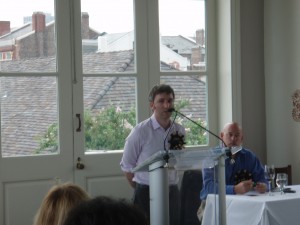In his last act as executive director of Sweet Home New Orleans, Jordan Hirsch declared, “This is a crisis.”
Hirsch is stepping down from leadership of the non-profit agency and will be replaced by Gabriela Hernandez, and Thursday afternoon at Galvez Restaurant in the French Quarter, he presented the results of Sweet Home New Orleans’ third annual State of the New Orleans Music Community Report. According to the study, before Hurricane Katrina musicians played an average of 12 times a month; now, that number has dropped to six times a month. The average per-gig take has dropped, and because of the economy, many musicians have lost day jobs or had their hours reduced. As a result, the median income for Sweet Home clients has dropped from $21,312 to $14,700.
The scarier news is that some of these conditions are likely to continue. “This year the community has reached a plateau of 80 percent of its pre-Katrina size,” the report reads. “Meanwhile, the number of gigs per month for New Orleans musicians has stayed consistent at around 50 percent of the pre-Katrina level. These figures suggest new baselines for the population size and amount of work available to the music community.
“It’s critically important that we find new ways to address this culture,” Hirsch said as he reviewed the report’s findings. The combination of fewer tourists, fewer conventions, the recession and fewer residents have reduced the number of opportunities for musicians—particularly those playing traditional jazz and tourist-oriented gigs—to earn a living, and the result affects many aspects of their lives. More than 70 percent of Sweet Home clients lack health insurance, and they have been disproportionately affected by the housing crisis. “[Homeownership] remains out of reach for many in 2010, and sustaining homeownership has become increasingly challenging for others who face unpredictable fluctuations in their earnings,” the report says. “Consequently, the foreclosure risk for musicians and culture bearers is 17 percent, which is many times greater than the risk for the general population.”
The study is largely based on clients of Sweet Home New Orleans, the needs-based non-profit organization helping the city’s musicians and culture bearers get home and back to work. As such, the results are slightly skewed by a study pool that needed some form of assistance, but that includes members of communities that are relatively healthy, including the brass band scene.
The report also included some good news. Social Aid and Pleasure Clubs have returned to 92 percent of their pre-Katrina activity. For LSU sociologist Dr. Rick Weil, who conducted the study, their health reveals one of the keys to recovery is civic involvement. “The stronger the togetherness of a community, the better the recovery,” he said.
In his study, he found the social aid and pleasure club communities to be models of that concept. Their communities were some of the hardest hit, and they were underfunded by the Road Home program, but “[b]y the standards of the civic engagement literature, SAPC members are model citizens,” the study says. “[T]hey are community leaders; they perform service; they support each others in times of need. SAPC members are mostly lower-income African Americans, yet they are more civically active, service-oriented, and trusting than even the rich or well-educated.”
To download a copy of the Sweet Home New Orleans report, go to SweetHomeNewOrleans.com.





